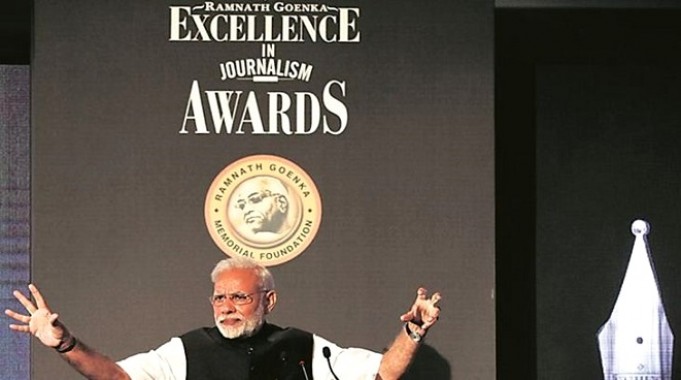The right person to give journalism awards?
PM Modi at the Indian Express awards
" May the pen, the idea, the word and the effort of everyone contribute to the progress of the country in one way or the other." This was PM Modi in his address at the Ramnath Goenka Awards for Excellence in Journalism for work done in 2015. One wonders what 'progress of the country' means for him. It was only yesterday that the Ministry of Information and Broadcasting recommended that the news channel NDTV be taken off for 24 hours for allegedly revealing "strategically sensitive information" during its coverage of the Pathankot incident. The irony was underlined when Mr Modi used the occasion to dwell on the horror of the Emergency.
Is this the same chief who in the past two years has seen himself stand on the opposite side of cases of investigative journalism? Remember the village which he talked about so proudly in his Independence day speech of being electrified that had later turned out to be a complete farce?
This crackdown on NDTV is basically a continuation of the media gagging prevalent in the Kashmir valley as of now. Kashmir Reader is the latest victim in the incidents of banning newspapers and magazines during the unrest unfolding in the valley. The North East has also been no stranger to such crackdowns. However, the issue naturally gains more credence when something of this sort happens in the buzzing environment of Lutyens Delhi. Even at a time when the PM appears to give space for 'constructive criticism', his Minister of State Kiren Rijiju openly casts aspersions on all those who are finding faults and loopholes in the recent Bhopal incident which saw 8 SIMI members killed in what has largely been touted as a 'fake encounter'. Another of his ministers pejoratively called journalists 'presstitutes' not long ago, though the PM’s address espoused the profession’s right to question everyone.
His address also stayed conveniently away from all the pressing issues at hand. Instead, technology was cited as one of the biggest challenges that the media faces. What are the challenges that the media imposes on the government with the help of this technology is something that was smoothly bypassed. Which of these exactly fits the bill of the 'progress of country' which he alluded to in the beginning? While we got futuristic talk with a positive veneer, 'negative' talk such as criticism was kept at bay. More so when he asked, "Why can't we have a Global media to tell the world the right way to live?". When was the media supposed to be a moralising institute anyway? Its fundamental job has always been to pose hard-hitting questions. Will Modi unambiguously acknowledge Rana Ayub's 'Gujarat Files', Paranjoy GuhaThakurta's 'Gas Wars' and Manoj Mitta's 'The Fiction of Fact Finding' as examples of 'constructive criticism' even if he doesn't agree with most of what they have to say?
This becomes important as it seldom remains an issue of having the right to question everyone. The reaction coming from the opposite end matters as it charts the future discourse of this very constructive criticism. Perhaps, Modi knows its significance as he has a first hand experience of walking out of an interview with Karan Thapar who raised some pointed questions about the Gujarat pogrom of 2002. Sure you need not always use words for showing disagreement. But that was not constructive criticism. That was an act of wilful avoidance.
There was one incident at the Ramnath Goenka awards that certainly falls in the category of constructive criticism. Akshaya Mukul, the writer of the much acclaimed "Gita Press : The making of Hindu India" , won the award for the best non-fiction piece of work. He skipped the award ceremony saying that he could not imagine standing in the same frame which will include Modi in it. Over here, being explicitly clear about the reasons for your absence should get construed as a form of dissent and thereby a signifier of constructive criticism of what exactly Modi has stood for in the past. In an interview to The Wire, he clarified that his stand was based on how Modi and his government have reacted to the media in the past two years and not because of the subject matter of the book clashing overtly with the BJP's ideology. He saw the clampdown on the media as a more serious issue.
Raj Kamal Jha, the editor of the Indian Express in his vote of thanks highlighted the pitfalls of 'selfie journalism' and the way it hampers the work of unbiased reportage. But time and again in the recent past, we have seen journalists clicking selfies with Modi, making a complete mockery of what their profession stands for. And to me, the PM awarding and congratulating journalists is somehow the legitimization of this "awe-struck" style of reportage. To receive an award from him further perpetuates this notion. Journalists should be exhorted to see politicians in a deglamorised, critical and non-partisan manner.
The writer has recently completed his masters in political science from Jamia Milia Islamia







